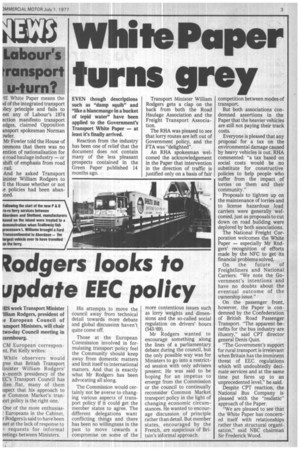White Paper turns gre
Page 5

If you've noticed an error in this article please click here to report it so we can fix it.
EVEN though descriptions such as "damp squib" and "like a blancmange in a bucket of tepid water" have been applied to the Government's Transport White Paper — at least it's finally arrived.
Reaction from the industry has been one of relief that the document does not contain many of the less pleasant prospects contained in the Green Paper published 14 months ago. Transport Minister William Rodgers gets a clap on the back from both the Road Haulage Association and the Freight Transport Association.
The RHA was pleased to see that lorry routes are left out of Government policy, and the FTA was "delighted".
An RHA spokesman welcomed the acknowledgement in the Paper that intervention in the direction of traffic is justified only on a basis of fair competition between modes of transport.
But both associations condemned assertions in the Paper that the heavier vehicles are still not paying their track costs.
Everyone is pleased that any proposal for a tax on the environmental damage caused by heavy vehicles is out. RHA commented: "a tax based on social costs would be no substitute for constructive policies to help people who suffer from the impact of lorries on them and their community."
Proposals to tighten up on the maintenance of lorries and to license hazardous load carriers were generally welcomed, just as proposals to cut down on road building were deplored by both associations.
The National Freight Corporation welcomes the White Paper — especially Mr. Rodgers' recognition of efforts made by the NFC to get its financial problems solved.
On the future of Freightliners and National Carriers: "We note the Government's intentions and have no doubts about the eventual outcome of the ownership issue."
On the passenger front, however, the Paper is condemned by the Confederation of British Road Passenger Transport. "The apparent benefits for the bus industry are illusory," said CPT director general Denis Quin.
"The Government's support for rural transport is irrelevant when Britain has the imminent threat of EEC regulations which will undoubtedly decimate services and at the same time put fares up to an unprecedented level, he said.
Despite CPT reaction, the National Bus Company is pleased with the "realistic" approach of the Paper.
"We are pleased to see that the White Paper has concerned itself with relationships rather than structural organisation," said NBC chairman Sir Frederick Wood.








































































































































